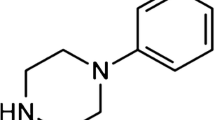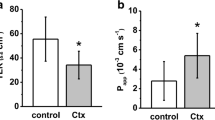Abstract
Unconjugated bile acids such as cholic acid cause diarrhoea, mucosal irritation and toxicity. We sought to define the mechanism of cholate permeation across intestinal mucosal cells to understand how cellular exposure and accumulation are deleterious to mucosal function. Human intestinal Caco-2 and T84 cell monolayers were prepared by high-density seeding and cultured for >14 days on permeable culture supports. Cholate transport and cellular accumulation were determined using [3H]cholic acid. Epithelial barrier function was assessed by measuring transepithelial electrical resistance (R t) and [14C]mannitol fluxes. Exposure of Caco-2 epithelia to serosal cholate caused a dose- and time-dependent disruption of barrier function. Apical exposure was without disruptive effect. Similar responses were observed for T84 epithelia. Cholate was preferentially accumulated across the basolateral surfaces in both Caco-2 and T84 cells, but was subject to active transepithelial secretion in Caco-2 monolayers only. Net secretion was substantially reduced by ATP depletion, showed saturation kinetics, and was subject to competitive inhibition by other bile acids. Cholate secretion was also sensitive to inhibition by the leukotriene antagonist MK-571 but not by digoxin, suggesting that MRP2, not MDR1, was responsible. RT-PCR and Western blotting confirmed MRP2 expression in Caco-2 epithelia but indicated its apparent absence from T84 cells.
Similar content being viewed by others
Author information
Authors and Affiliations
Additional information
Electronic Publication
Rights and permissions
About this article
Cite this article
Lowes, S., Simmons, N.L. Human intestinal cell monolayers are preferentially sensitive to disruption of barrier function from basolateral exposure to cholic acid: correlation with membrane transport and transepithelial secretion. Pflügers Arch - Eur J Physiol 443, 265–273 (2001). https://doi.org/10.1007/s004240100686
Received:
Revised:
Accepted:
Published:
Issue Date:
DOI: https://doi.org/10.1007/s004240100686




